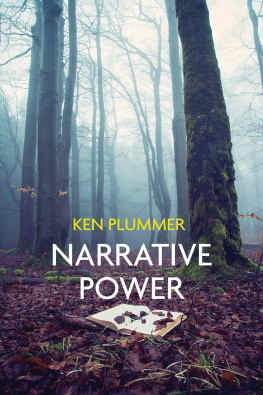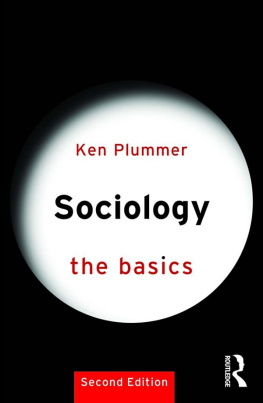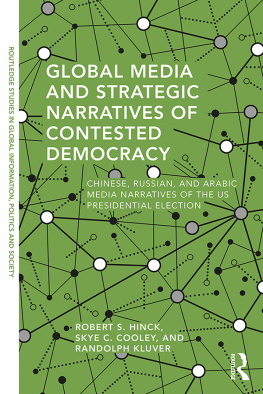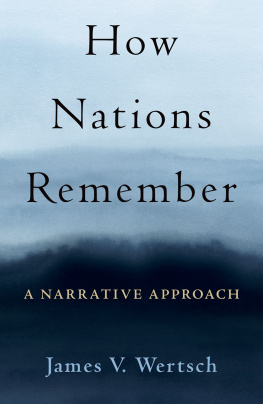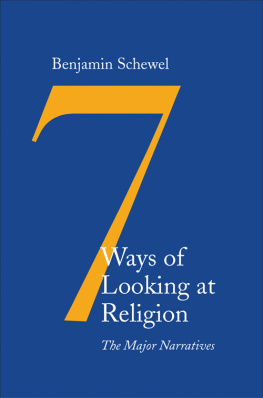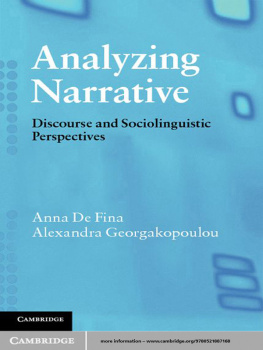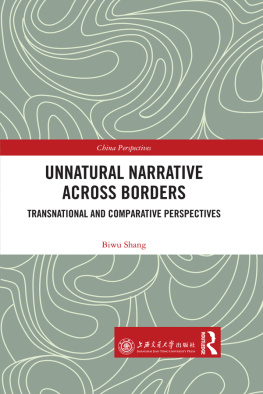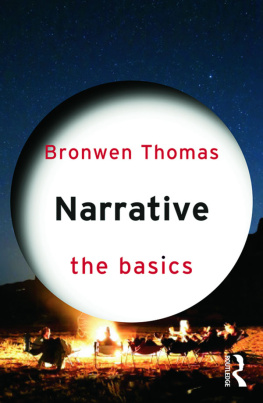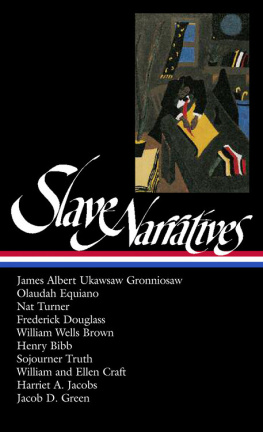
Narrative Power
The Struggle for Human Value
Ken Plummer
polity
Copyright Ken Plummer 2019
The right of Ken Plummer to be identified as Author of this Work has been asserted in accordance with the UK Copyright, Designs and Patents Act 1988.
First published in 2019 by Polity Press
Polity Press
65 Bridge Street
Cambridge CB2 1UR, UK
Polity Press
101 Station Landing
Suite 300
Medford, MA 02155, USA
All rights reserved. Except for the quotation of short passages for the purpose of criticism and review, no part of this publication may be reproduced, stored in a retrieval system or transmitted, in any form or by any means, electronic, mechanical, photocopying, recording or otherwise, without the prior permission of the publisher.
ISBN-13: 978-1-5095-1706-0
A catalogue record for this book is available from the British Library.
Library of Congress Cataloging-in-Publication Data
Names: Plummer, Kenneth, author.
Title: Narrative power : the struggle for human value / Ken Plummer.
Description: Cambridge, UK ; Medford, MA, USA : Polity Press, 2018. | Includes bibliographical references and index.
Identifiers: LCCN 2018023141 (print) | LCCN 2018038956 (ebook) | ISBN 9781509517060 (Epub) | ISBN 9781509517022 | ISBN 9781509517039 (pb)
Subjects: LCSH: Narrative inquiry (Research method) | Power (Social sciences) | Sociology--Biographical methods.
Classification: LCC H61.295 (ebook) | LCC H61.295 .P58 2018 (print) | DDC 001.4/33--dc23
LC record available at https://lccn.loc.gov/2018023141
The publisher has used its best endeavours to ensure that the URLs for external websites referred to in this book are correct and active at the time of going to press. However, the publisher has no responsibility for the websites and can make no guarantee that a site will remain live or that the content is or will remain appropriate.
Every effort has been made to trace all copyright holders, but if any have been overlooked the publisher will be pleased to include any necessary credits in any subsequent reprint or edition.
For further information on Polity, visit our website: politybooks.com
Stories animate human life: that is their work. Stories work with people, for people, and always stories work on people, affecting what people are able to see as real, as possible, and as worth doing or best avoided A good life requires living well with stories. When life goes badly, a story is often behind this too Narrative makes the earth habitable for human beings.
Arthur Frank, Letting Stories Breathe
That every individual life between birth and death can eventually be told as a story with beginning and end is the prepolitical and prehistorical condition of history, the great story without beginning and end. But the reason why each human life tells its story and why history ultimately becomes the storybook of mankind, with many actors and speakers and yet without any tangible authors, is that both are the outcomes of action.
Hannah Arendt, The Human Condition
Every conflict is in part a battle over the story we tell, or who tells and who is heard.
Rebecca Solnit, Hope in the Dark
Prologue: Going Backstage
Once upon a time, there was the story. Like you, I have lived all my life with stories. It is an almost universally recognized fact that what makes our humanity distinct from other life on Planet Earth is our ability to tell and listen to stories. What is less universally recognized is that we are also thinkers about the power of our stories: we do not just tell and listen, we also reflect upon them and act with them. Stories help us to imagine, animate and value human life. We live our lives between stories of imagination and stories of reality: call this, if you like, the reality puzzle. This book provides some further ways to reflect on these flowing stories: I ask how power shapes stories, how stories shape power and how understanding the way all this works might help move us towards better worlds for all.
From the slow evolution of the face-to-face local oral cultures of antiquity to our currently dazzling moments of global digitalism that convulse us with rapidly fragmenting, fast-speed, niched networked tweets, we have always been the animal living with narrative power. We dwell across the globe in a vast multitude of complex interconnecting reflective storied social worlds. Our narratives are continually born, sparkle, flicker, silence and die; some get remembered. Our everyday lives are influenced, shaped and even coerced, by the storied actions of others. They become saturated in everyday political relations. And this is a basic puzzle: just how do we human beings come to dwell within this storypower dialogue, and what does it do to humane governance and us?
A life in stories
I guess I started being interested in narrative power when I was about 15. As an unread working-class teenage boy and young man born in Wood Green, London, I struggled for a few years with the possibility of being homosexual. This was England in the early 1960s and homosexuality was stigmatized as sin, sickness, crime and tragedy. (It still is today in much of the world.) Everywhere I turned, I heard stories and saw images that suggested my being was a problem and I was doomed for a tragic existence. My life became a dialogue with queer stories. Watching the film Victim in 1961 displayed this only too clearly. Here was the story of a life of queer-bashing, blackmail, therapy, prison, darkness, sorrow and ultimately suicide. If I was to believe this dominant powerful narrative of the day, could this well be my own pathetic life story? Maybe. If I had been born any earlier, this may have been my fate, as it certainly was for a great many. But I was also a child of the countercultural 1960s and challenging counter-narratives were in the making. Among these was the emerging powerful, positive story of Gay Pride and Gay Rights: Sing if youre glad to be gay, sing if you are happy that way. A few lawyers were beginning to tell new stories to change the law; some psychiatrists were reworking their scripts of sickness into health; and a new language and culture of stories was starting to be told that gave us new visions. A new narrative, and imagery, were in the making and I was living them: the Coming Out as Gay or Lesbian story became a growing genre of writing and film and eventually appeared in many countries across the world. Slowly, new possibilities were being sensed. I seized the moment, as we say, and started to refashion my little youthful life and world through these new tales. My life was not to be downtrodden: I was not going to live in the closet; I was going to make sure I could lead a life where I could be an out gay man. And this is more or less what happened, and very quickly. The old story was discarded, the new one shaped and adopted. The counter-stories of social movements changed my life. But I also learnt that stories are never finished there is a kaleidoscope of sensibilities around them, and they will keep moving on.
Retrospectively, I can see unfolding in all of this a major genre of storytelling, which has sculptured many little lives and big political moments: a self-fulfilling narrative. Stories become grounded in everyday life, have consequences, shape outcomes, change lives and sometimes become self-amplifying: telling the story helps bring about what it tells. This means we had better be careful what stories we tell. I was lucky to find new stories in the making: the old ones would have made my life very unhappy. I slowly learnt that stories have a history, and their right moment matters a great deal.
Next page
